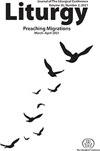A Practice of Weaving: The Life and On-Going Legacy of Womanist Liturgical Praxis
IF 0.3
0 RELIGION
引用次数: 0
Abstract
To look back on the journey of womanist scholarship within liturgical scholarship is to be radically honest about the lack thereof, abundantly grateful for the work that has been done, and actively hopeful for what is to come. As a Black feminist and womanist practical theologian who prioritizes the practices of proclamation, ritual, and worship, I found myself searching for a lineage when entering into the scholarly guilds. When I began to understand more fully that much of what I had been taught as “foundational” had been rooted in white supremacy, scholarship that put Black women at the center ignited my own scholarly curiosities and offered me an intellectual home. Many theories and terms that have been considered classic and critical have often left out the voices of all women and Black people. Although the experiences of Black women have been given the least amount of consideration as central to liturgical theology, some scholars have laid a foundation that is steadily being built upon by present womanist liturgical scholars. This is where my hope for liturgical scholarship stems. Scholarship that prioritizes the experiences and practices of Black women is not an optional epistemological and theoretical perspective for liturgical scholarship. Black feminist and Womanist scholarship that begins with Black women not only contributes particular wisdom to the guild, but methodologically offers critical insight in how liturgical scholarship might be engaged at large. In this essay I assert three ways that womanist thought contributes to liturgical scholarship and what it asks of the study. Womanist liturgical scholarship challenges normative views of liturgy by prioritizing resistance, embodiment, and esthetic disruption as critical markers of womanist liturgical scholarship. This is not an exhaustive list, but it does allow for an opening to the conversation of the contribution and critical impact.编织的实践:女性主义文学实践的生命与遗产
回顾女性主义学术在礼仪学术中的历程,就是要从根本上诚实地面对它的缺失,对已经完成的工作充满感激,并对未来充满希望。作为一名黑人女权主义者和女性主义实践神学家,我优先考虑宣言、仪式和崇拜的实践,当我进入学术行会时,我发现自己在寻找一个血统。当我开始更充分地了解到,我所接受的许多“基础”教育根植于白人至上主义时,以黑人女性为中心的学术点燃了我对学术的好奇心,为我提供了一个智力上的家。许多被认为是经典和批判性的理论和术语往往忽略了所有女性和黑人的声音。尽管黑人女性的经历作为礼仪神学的中心很少被考虑,但一些学者已经奠定了一个基础,现在的女性主义礼仪学者正在稳步地建立这个基础。这就是我对礼仪奖学金的希望所在。优先考虑黑人妇女的经历和实践的学术并不是礼仪学术可选的认识论和理论视角。从黑人女性开始的黑人女权主义和女性主义学术不仅为公会贡献了特殊的智慧,而且在方法论上为礼仪学术如何广泛参与提供了批判性的见解。在这篇文章中,我断言女性主义思想对礼仪学术的贡献有三种方式,以及它对研究的要求。女性主义礼仪学术通过优先考虑抵抗、具体化和审美破坏作为女性主义礼仪学术的关键标志,挑战了礼仪的规范观点。这不是一个详尽的清单,但它确实允许讨论贡献和关键影响。
本文章由计算机程序翻译,如有差异,请以英文原文为准。
求助全文
约1分钟内获得全文
求助全文

 求助内容:
求助内容: 应助结果提醒方式:
应助结果提醒方式:


